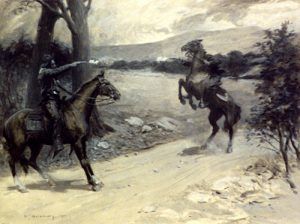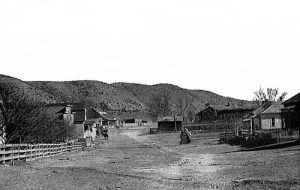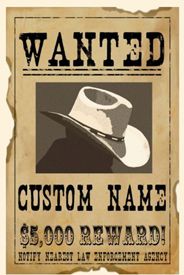By Emerson Hough in 1905
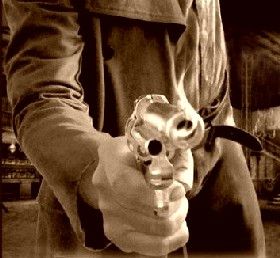
Gunfighter
Energy and action may be of two sorts, good or bad, and we can phrase it in human affairs. The live wires that net our streets are more dangerous than all the bad men the country ever knew, but we call electricity on the whole good in its action. We lay it under the law, but sometimes, it breaks out and has its own way. These outbreaks will occur until the end of time in live wires and vital men. Each land produces its own men individually bad — and, in time, other bad men who kill them for the general good.
There are bad Chinamen, bad Filipinos, bad Mexicans and Indians, bad black men, and bad white men. The white bad man is the worst bad man in the world, and the prize-taking bad man of the lot is the Western white bad man. Turn the white man loose in a land free of restraint — such as was always that Golden Fleece land, vague, shifting, and transitory, known as the American West — and he simply reverts to the ways of Teutonic and Gothic forests.
The civilized empire of the West has grown despite this because of that other strange germ, the love of law, anciently implanted in the soul of the Anglo-Saxon. That there was little difference between the bad man and the good man who went out after him was frequently demonstrated in the early roaring days of the West. The religion of progress and civilization meant very little to the Western town marshal, who sometimes, or often, was a peace officer chiefly because he was a good fighting man.
We band together and “elect” political representatives who do not represent us. We “elect” executive officers who execute nothing but their own wishes. We pay innumerable policemen to take the burden of self-protection from our shoulders, and the policemen do not do this. Back of all, the law is the undelegated personal right, that vague thing which, nonetheless, is recognized in all the laws and charters of the world, as England and France of old and Russia today may show. This undelegated personal right is in each of us or ought to be. If there is in you no hot blood to break into flame and set you to arbiter for yourself in some sharp, crucial moment, then God pity you, for no woman ever loved you if she could find anything else to love, and you are fit neither as man nor citizen.
As the individual retains an undelegated right, so does the social body. We employ politicians, but most of us despise politicians and love fighting men. Society and law are not absolutely wise nor right, but only as a compromise relatively wise and right. The bad man, so-called, may have been, in large part, relatively bad. This much we may say scientifically and without the slightest cheapness. It does not mean we shall waste any maudlin sentiment over a desperado. Indeed, it does not mean we shall have anything but contempt for the pretender at desperadoes.
Who and what was the bad man? Scientifically and historically, he was even as you and I. From where did he come? From any and all places. What did he look like? He came in all sorts and shapes, all colors and sizes — just as cowards do. As to knowing him, the only way was by trying him. His reputation, true or false, just or unjust, became the herald of the bad man in due time. The “killer” of a Western town might be known throughout the state or in several states. His reputation might long outlast that of able statesmen and public benefactors.
What distinguished the bad man in peculiarity from his fellowman? Why was he better with weapons? What is courage in the last analysis? We ought to be able to answer these questions purely scientifically. We have machines for photographing relative quickness of thought and muscular action. We can record the varying speeds of impulse transmission in the nerves of different individuals. If you were picking out a bad man, would you select one who, on the machine, showed a dilatory nerve response? Hardly. The relative fitness for a man to be “bad,” to become extraordinarily quick and skillful with weapons, could, without doubt, be predetermined largely by these scientific measurements. Of course, having no thought machines in the early West, they got at the matter by experimenting and so, very often, by a graveyard route. You could not always stop to feel the pulse of a suspected killer.
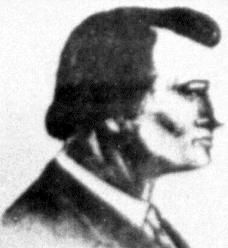
Joseph Slade
The use of firearms with swiftness and accuracy was necessary for the calling of the desperado after fate had marked him and set him apart for the inevitable, though possibly long-deferred, end. This skill with weapons was a natural gift for nearly every man who attained a great reputation, whether as the killer of victims or as the killer of killers. The practice assisted in proficiency, but a Wild Bill Hickok, a Joseph A. Slade, or a Billy the Kid was born and not made.
Quickness in nerve action is usually backed by good digestion, and a hard life in the open is good medicine for the latter. This, however, does not wholly cover the case. A slow man also might be a brave man. Sooner or later, if he went into the desperado business on either side of the game, he would fall before the man who was as brave as himself and a fraction faster with the gun.
There were unknown numbers of potentially bad men who died mute and inglorious after a life spent at a desk or a plow. They might have been bad if matters had shaped right for that. Each war brings out its own heroes from unsuspected places; each sudden emergency summons its own fit man. Say that a man took to the use of weapons and found himself the arbiter of life and death with lesser animals and able to grant them either at a distance. He went on, pleased with his growing skill with firearms. He discovered that as the sword had in one age of the world lengthened the human arm, so did the six-shooter — that epochal instrument, invented at precisely that time of the American life when the human arm needed lengthening — extend and strengthen his arm and make him and all men equal. The user of weapons felt his powers increased. So now, in time, a moment of danger came to him. There was his enemy. There was the affront, the challenge. Perhaps it was male against male, a matter of sex, prolific always in bloodshed. It might be a matter of property, or perhaps it was some taunt as to his courage. Perhaps alcohol came into question, as was often the case. For one reason or the other, it came to the ordeal of combat. It was the un-delegated right of one individual against that of another. The law was not invoked — the law would not serve. Even as the quicker set of nerves flashed into action, the arm shot forward and smote the point of flame as did once the point of steel. The victim fell, his weapon clutched in his hand, a fraction too late. The law cleared the killer. It was “self-defense.” “It was an even break,” his fellowmen said, although, after that, they were more reticent with him and sought him out less frequently.
“It was an even break,” said the killer to himself — “an even break, him or me.” But, perhaps, the repetition of this did not serve to blot out a certain mental picture. I have had a bad man tell me that he killed his second man to get rid of the mental image of his first victim.
But this exigency might arise again; indeed, it most frequently did arise. Again, the embryo bad man was the quicker. His self-approbation now, perhaps, began to grow. This was a crucial time of his life. He might go on now and become a bad man or cheapen and become an imitation desperado. In either event, his third man left him still more confident. His courage and his skill in weapons gave him assuredness and ease at the time of an encounter. He was now becoming a specialist. Time did the rest until, at length, they buried him.
The bad man of a genuine sort rarely looked the part assigned to him in the popular imagination. The long-haired blusterer, adorned with a dialect that never was spoken, serves very well in fiction about the West, but that is not the real thing. The most dangerous man was apt to be quiet and smooth-spoken. When an antagonist blustered and threatened, the most dangerous man only felt rising in his soul, keen and stern, that strange exultation that often comes with combat for the man naturally brave. A Western officer of established reputation once said to me, while speaking of a recent personal difficulty into which he had been forced: “I hadn’t been in anything of that sort for years, and I wished I was out of it. Then I said to myself, ‘Is it true that you are getting old — have you lost your nerve?’ Then all at once, the old feeling overcame me, and I was just like I used to be. I felt calm and happy, and I laughed after that. I jerked my gun and shoved it into his stomach. He put up his hands and apologized. ‘I will give you a hundred dollars now,’ he said, ‘if you will tell me where you got that gun.’ I suppose I was a trifle quick for him.”
The virtue of the “drop” was eminently respected among bad men. Sometimes, however, men were killed in the last desperate conviction that no man on earth was as quick as they. What came near being an incident of that kind was related by a noted Western sheriff.
“Down on the edge of the Pecos Valley,” said he, “a dozen miles below old Fort Sumner, there used to be a little saloon, and I once captured a man there. He came in from somewhere east of our territory and was wanted for murder. The reward offered to him was twelve hundred dollars. Since he was a stranger, none of us knew him, but the sheriff’s descriptions said he had a freckled face, small hands, and a red spot in one eye. I heard that there was a new saloon keeper in there and thought he might be the man, so I took a deputy and went down one day to see about it.
“I told my deputy not to shoot until he saw me go after my gun. I didn’t want to hold the man up unless he was the right one, and I wanted to be sure about that identification mark in the eye. Now, when a bartender is waiting on you, he will never look you in the face until you raise your glass to drink. I told my deputy that we would order a couple of drinks and so get a chance to look this fellow in the eye. When he looked up, I did look him in the eye, and there was the red spot!
“I dropped my glass, jerked my gun, and covered him, but he wouldn’t put up his hands for a while. I didn’t want to kill him, but I thought I would have to. He kept both hands resting on the bar, and I knew he had a gun within three feet of him somewhere. At last, slowly, he gave in. I treated him well, as I always did a prisoner, and told him we would square it if we had made any mistake. We put irons on him and started with him in a wagon for Las Vegas. The next morning, out on the trail, he confessed everything to me. We turned him over, and later, he was tried and hung. I always considered him to be a pretty bad man. So far as a result was concerned, he might about as well have gone after his gun. I certainly thought that was what he was going to do. He had sand. I could see him stand there and balance the chances in his mind.
“Another of the nerviest men I ever ran up against,” the same officer said reflectively, “I met when I was sheriff of Dona Aña County, New Mexico. I was in Las Cruces when there came in a sheriff from over in the Indian Nations looking for a fugitive who had broken out of a penitentiary after killing a guard and another man or so. This sheriff told me that the criminal in question was the most desperate man he had ever known and that no matter how we came on him, he would fight, and we would have to kill him before taking him. We located our man, who was cooking on a ranch six or eight miles from town. I told the sheriff to stay in town because the man would know him and would not know us. I had a Mexican deputy along with me.
“I put my deputy on one side of the house and went in. I found my man wiping his hands on a towel after washing his dishes. I threw down on him, and he answered by smashing me in the face and then jumping through the window like a squirrel. I caught at him and tore the shirt off his back, but I didn’t stop him. Then I ran out of the door and caught him on the porch. I did not want to kill him, so I struck him over the head with the handcuffs I had ready for him. He dropped but came up like a flash and struck me so hard with his fist that I was badly jarred. We fought hammer and tongs for a while, but at length, he broke away, sprang through the door, and ran down the hall. He was going to his room after his gun. At that moment, my Mexican came in and, having no sentiment about it, just whaled away and shot him in the back, killing him on the spot. When they examined this man’s body, the doctors said he was the most perfect physical specimen they had ever seen. I can testify that he was a fighter. The sheriff offered me the reward, but I wouldn’t take any of it. I told him that I would be over in his country sometime and that I was sure he would do as much for me if I needed his help. I hope that if I do have to go after his particular sort of bad people, I’ll be lucky in getting the first start on my man. That man was as desperate a fighter as I ever saw or expected to see. Give a man of that stripe any kind of a show, and he’s going to kill you, that’s all. He knows that he has no chance under the law.
“Sometimes they got away with desperate chances, too, as many a peace officer has learned to his cost. The only way to go after such a man is to go prepared and give him no earthly show to get the best of you. I don’t mean that an officer ought to shoot down a man if he has a show to take his prisoner alive, but I do mean that he ought to remember that he may be pitted against a man who is just as brave as he is, and just as good with a gun, and who is fighting for his life.”
Of course, such a man as this, whether confronted by an officer of the law or by another man against whom he has a personal grudge or who has in any way challenged him to the ordeal of weapons, was steadfast in his own belief that he was as brave as any and as quick with weapons. Thus, until at length he met his master in the law of human progress and civilization, he added to his own list of victims or was added to the list of another of his own sort. For a very long time, moreover, there existed a great region on the frontier that the law could not protect. Therefore, there was a good reason for a man’s learning to depend upon his courage, strength, and skill. He had nothing else to protect him, whether good or bad. In the typical days of the Western bad man, life was the property of the individual and not of society, and one man placed his life against another’s as the only way of solving hard personal problems. Those days and those conditions brought out some of the boldest and most reckless men the earth had ever seen. Before we freely criticize them, we ought thoroughly to understand them.
Compiled and edited by Kathy Alexander/Legends of America, updated October 2023.
Go To Next Chapter – The Imitation Desperado
About the Author: Excerpted from The Story of the Outlaw; A Study of the Western Desperado, by Emerson Hough; Outing Publishing Company, New York, 1907. This story is not verbatim, as it has been edited for clerical errors and updated for the modern reader. Emerson Hough (1857–1923).was an author and journalist who wrote factional accounts and historical novels of life in the American West. His works helped establish the Western as a popular genre in literature and motion pictures. For years, Hough wrote the feature “Out-of-Doors” for the Saturday Evening Post and contributed to other major magazines.
Other Works by Emerson Hough:
The Story of the Outlaw – A Study of the Western Desperado – Entire Text

